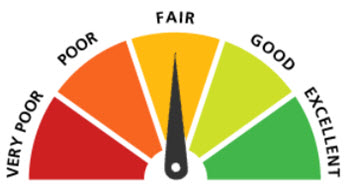In the United States, many lenders will look at your credit score (typically the FICO score) rather than spend time reading all the details of your credit report. Your credit score will have a major impact on what loans you are approved for and how good the offers are. You therefore have a lot to gain by improving your credit score. Below, you will find a few helpful tips.
 The classic FICO score dominates the U.S. market, but there are other scores available as well from competing agencies. There are also several different FICO scores available in addition to the classic one, to target different lenders. A particular score can derive its information from various sources, and it can also use an algorithm that is somewhat different from the ones utilized by other credit scores. This means that your credit score can vary somewhat depending on which score the lender decides to check. Below, we have listed factors that are generally accepted as being true for a vast majority of credit scores in the United States.
The classic FICO score dominates the U.S. market, but there are other scores available as well from competing agencies. There are also several different FICO scores available in addition to the classic one, to target different lenders. A particular score can derive its information from various sources, and it can also use an algorithm that is somewhat different from the ones utilized by other credit scores. This means that your credit score can vary somewhat depending on which score the lender decides to check. Below, we have listed factors that are generally accepted as being true for a vast majority of credit scores in the United States.
Pay on time
We will not dwell on this point much, because we assume that you already know that not paying your debts and bills on time can have a negative impact on your credit score. Most creditors will not report you for just one delayed payment, but it is best to avoid creating a habit of tardiness.
Keep your credit utilization below 30%
Generally speaking, it is not a good idea to utilize more than 30% of your available credit on credit cards and similar credit types. Many people know that having maxed out credit cards looks bad on your credit report, but few realize that even a 35% credit utilization ratio can have a negative impact on your credit score.
If you have credit cards (or similar credit) and owe more than 30 percent of the available credit, make it a priority to pay it down to below 30 percent. Ideally, create a bit of a margin instead of being satisfied with 29 percent.
Another way of getting your credit utilization ratio down is to increase the credit limit. If you get an offer to increase the limit on one of your credit cards, don’t turn it down automatically just because you don’t want to use that much credit. Having a lot of room between approved credit and utilized credit will be good for your credit score.
Consolidate debts
While having a credit history that includes a few different types of well-manged debt is good, owing money to a myriad of different lenders at the same time can look bad and lower your credit score. There is also an increased risk of you forgetting to make a payment on time if you have a lot of different debts to juggle.
Do you have a lot of different small debts spread out over many lenders? If your credit score is reasonably good, you should consider consolidating your debt because with a reasonably good credit score you can probably negotiate for a bigger loan with a lower interest rate than what you are paying on all those small loans. Get a large enough loan with good terms and use it to pay off all the small debts. In addition to making your credit report look better, you may also save some money on administrative fees and interest rates. Ideally, use the money to pay down you debt faster.
Check your score regularly and report errors
 It is a good idea to check your credit score and your credit report regularly. Immediately report any errors. Also check if there is anything that you can do to make the credit report look better and improve your credit score.
It is a good idea to check your credit score and your credit report regularly. Immediately report any errors. Also check if there is anything that you can do to make the credit report look better and improve your credit score.
The three major credit bureaus in the United States will allow consumers to pull their own credit reports for free once a year.
Also, several credit card issuers will give you (the credit card holder) free access to your credit score throughout the year. Some even have tools that you can use to find good ways of improving your credit card score.
Clean up among the joint accounts and authorizations
Do you have joint credit with someone even though it’s really not useful for you anymore? Maybe an old joint check account with an ex-boyfriend? Or maybe you mother added you as an authorized user of her credit card to help you build credit history while you were still very young?
It is a good idea to clean up these old memories from the past, because they can cause trouble in the future. Your ex-boyfriend might be great guy, but what happens if he racks up $$$$ in medical debt and is forced to max out all possible credit venues? Remove yourself from the joint account before something outside your control wrecks your credit score.
It is quite common for a parent to add a child to the parent’s credit card as an authorized user, since being an authorized user can help the child build credit history. The authorized user is not legally responsible for the debt – that is the responsibility of the credit card holder. However, if you are the authorized user of a credit that isn’t managed well, this can go on your credit report and have a negative impact on your credit score.
Be efficient with your credit applications
When a prospective lender obtains your credit score, this is listed on your credit report. Having a lot of inquires listed can have a negative impact on your credit score, even if you don’t end up accepting the loan. This is why it is important to be prudent about applying for credit. For most credit scores, the inquiries made during the last 12 months will have the largest impacts. Inquiries older than that will either not count at all or just have a very small impact.
If you want to shop around and get offers from a lot of different lenders, make sure you send in all the applications within the same week or so. Credit bureaus are aware that smart consumers will shop around for credit and that in itself isn’t a sign of low creditworthiness. Therefore, most credit bureaus will lump together all inquires made within the same two weeks and only count it as one inquiry. For some credit scores, you even have more time on your hands to shop around, e.g. 45 days for certain FICO scores.
You checking your own credit score / report will not impact your credit score, and neither will a credit score / report pulled by employer for employee verification, or an inquiry made for a pre-screened offer of credit or insurance.
Build a credit history – even if you don’t need credit
Even if you don’t need credit right now, it is still a good idea to utilize credit just to be able to show a long history of responsible credit use. Of course, you need to be smart about it. You can for instance apply for a credit card with no annual fee and use it to pay for things that you must pay for anyway, such as rent and utilities. Pay the bill in full each month. You are now using credit and building credit history, but you’re not paying any annual fee or interest rate.
There is a common misconception that you won’t build credit history if you pay your credit card bill in full each month. This is not true. By using your credit card and paying the bill in full each month, you show that you can have access to credit without going crazy with it.
Your credit history will look even better it includes a few different types of credit instead of JUST student loans or JUST credit cards or JUST a home mortgage loan. Once again, be smart. Don’t go out and apply for a bunch of different credit types today, because that will just look bad and bring your credit score down rather than up. Take your time, and carefully select one credit type that you would like to add to your credit history. Once you have a well established history of handling that credit type (minimum 6 months) you may consider adding a new one.
Also, be smart when you select credit. Example: You already have a credit card, and you would now like to add installments to your credit history. If there is an appliance that you need to purchase anyway, see if you can buy it with installments without paying a lot for the credit. Some stores will for instance have offers of the type “no administration fee, and interest free for first 6 months”. They still make a profit from these offers since so many people wont pay off the debt within the initial 6 months. But you will. You can even set aside money in a separate savings account before you make the purchase, just to be 100% sure that you will have money to pay down the debt quickly.

